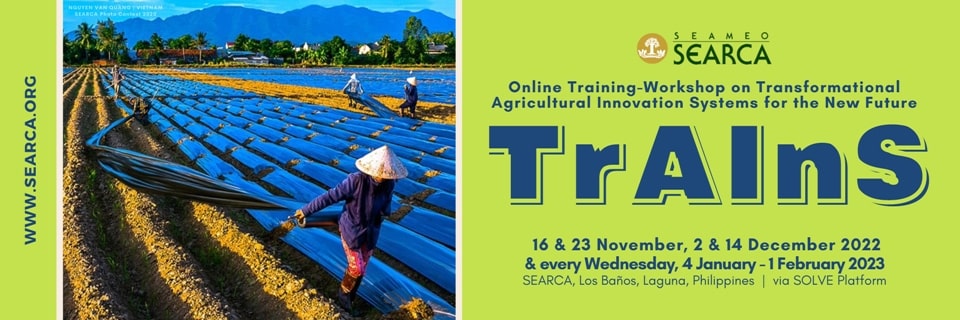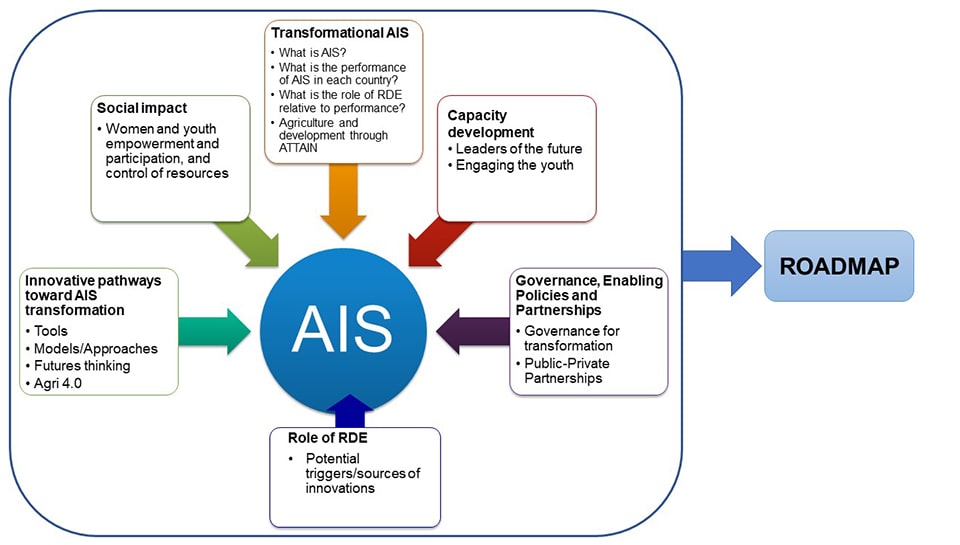
Contents
Background and Rationale
Agriculture is crucial in the development of Southeast Asian countries as this sector remains a major source of income for rural people. Hunger and malnutrition are higher in rural areas, while increasing opportunities to generate income from the sector can reduce poverty and improve the food security of a nation. The pressure on the agricultural sector is magnified if we consider the future projections of population growth, environmental stresses, production-related constraints, and climate change.
Improving the agricultural sector requires the enhancement of the innovation system to produce changes in the processes, policies, and vision among agricultural stakeholders that enables the creation of transformative and innovative programs and products. COVID-19 brought renewed challenges in agricultural production research, extension and education. ICT responsive to the changing future of agriculture. as the need to have safe and nutritious food supply became a major concern. The breakdown in the food supply chain sped up the adoption of ICT-based applications in farmer education and food delivery systems, as well as reinvigorated the interest of venture capitalists to invest in agriculture.
Recent developments show that markets influence innovation systems, but the government can facilitate improvements through strategic collaborations with the different stakeholders in the supply chain. This program aims to engage the participants in analyzing the challenges facing agriculture and in developing collaborative and transformative programs for agricultural development. In doing so, participants will be able to propose innovative programs that may positively impact their agricultural innovation systems.
Objectives
At the end of this training, the participants should be able to:
- Explain the current challenges in the agricultural sector.
- Analyze opportunities for innovation in the field for research, extension, and skills development of agricultural leaders.
- Develop skills in collaboratively building possible scenarios in agriculture through futures thinking.
- Propose transformative program interventions to enhance the agricultural innovation systems of their country.
Expected Outputs
- Roadmap that provides a clear path forward for all stakeholders from all sectors involved, highlighting the transformative strategies and program interventions to enhance agricultural innovation systems;
- Case studies on successful technological adoption, upscaling of technology for smallholder farmers, institutional problems related to poor and/or discontinued technological adoption; and
- Competency gap analysis and proposed action plan for innovative interventions for agricultural youth leaders.
Course Structure
 The Agriculture Innovation Systems (AIS) FrameworkGuided by the AIS training framework, the online training workshop is divided in to five modules as follows:
The Agriculture Innovation Systems (AIS) FrameworkGuided by the AIS training framework, the online training workshop is divided in to five modules as follows:
- Module 1: Transformation of Agriculture
- Module 2: Promoting Innovations in the Agricultural Innovations Systems
- Module 3: A New Breed of Agricultural Leaders
- Module 4: Promoting Transformations in the Agricultural Innovation Systems
- Module 5: Defining Agriculture for the New Future
| Module | Sessions/Topics | Module Description |
|---|---|---|
| Module 1: Transformation of Agriculture |
| This introductory module will provide a macroeconomic view of the role of agriculture in development by reviewing previous studies, identifying the foundations of agricultural growth, and explaining the importance of increasing agricultural productivity as a strategy to reduce poverty. |
| Module 2: Promoting Innovations in the Agricultural Innovations Systems |
| This module will discuss the changes in agriculture resulting from the 4th industrial revolution, and the technologies that are significantly impacting knowledge generation and sharing, farmer practices, and markets. The discussion moves into the analysis of governance principles that can facilitate a robust agricultural innovation system where research, extension, and marketing systems can operate efficiently to promote food security and inclusive agriculture amidst the 4th industrial revolution. |
| Module 3: A New Breed of Agricultural Leaders |
| This module will provide the participants the opportunity to examine the curriculum of their national universities and evaluate areas for further improvement to ensure that agricultural leaders are prepared to take on innovative leadership roles when they join the agricultural professionals. This module will also present an opportunity to investigate innovative programs directed to youth entrepreneurs as well as innovations done by youth leaders. |
| Module 4: Promoting Transformations in the Agricultural Innovation Systems |
| What is the future of agriculture? How can we plan for a future where the only certainty are disruptions and challenges? This module compels the participants to problematize agriculture years from now and work on how to create a humanized community characterized by prosperity and food security. At the end of the module, the participants will be able to: 1) explain the future of agriculture; 2) describe futures thinking; 3) practice tools in futures thinking; and 4) build scenarios using futures thinking. |
| Module 5: Defining Agriculture for the New Future | Sharing of key learnings and presentation of revised outputs/ plans/roadmaps. | |
Pre-Workshop Assignment
Prior to the start of the workshop, participants will be grouped per country and will be given the task to gather data on the status of the country's agricultural innovation system (AIS) over the past five years (2017-2022). Further details of the pre-training requirements will be provided in the Acceptance Letter of qualified nominees from Southeast Asian countries.
Who Should Attend?
Mid-to senior-level Southeast Asian professionals who are active in research and extension representing any of the following groups: a) Higher Education Institution (HEI) involved in teaching agricultural research and extension; b) government agencies/ministries; c) LGUs, NGOs, farmers organizations/ cooperatives; and d) private sector engaged in agricultural R & D and relevant civil society organizations (CSOs).
Registration
Applications are open until 15 October 2022.
The Application Form may be accessed at https://bit.ly/searcatrainsapp, and the Statements of Commitment form is to be uploaded in the provided platform.
The relevant form may be downloaded through the link below:
*To download, click the link then go to File -> Download